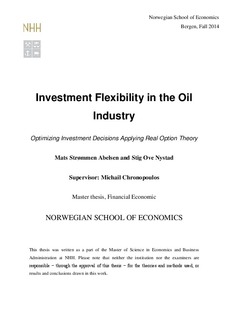Investment flexibility in the oil industry : optimizing investment decisions applying real option theory
Abstract
The ambition of the study is to apply relevant real option theory to a specific investment decision in the oil industry. Investment flexibility is significant in this industry, but several companies rely on the standard net present value approach when valuing an investment possibility. The motivation of the study is to suggest a better way of optimizing investment decisions for appliance in the industry, where accounting for embedded options is the main focus.
Present study compares two mutually exclusive projects for an operating company in the oil industry. This company can choose between these two projects under price- and oil discovery uncertainty. The first embedded option considered is an option to expand an operating project. The second embedded option considered is an option to switch to another project.
The problem is solved by creating a comprehensive model through financial mathematics and programming in Matlab®. The model provides closed form solutions to the specific case study. The case study provides valuable insight in how the availability of the option to defer investment and the embedded options can alter an investment decision.
Analyzing the option to defer investment shows that the company should not invest immediately when the project provides a positive net present value, like a breakeven analysis would suggest. Instead, the company should wait until the oil price is at a higher threshold. The analysis proves that embedded options provide sufficient value to alter a company’s investment decision. In addition, the uncertainty regarding an oil discovery process is proved to be a significant factor in the investment decision.
